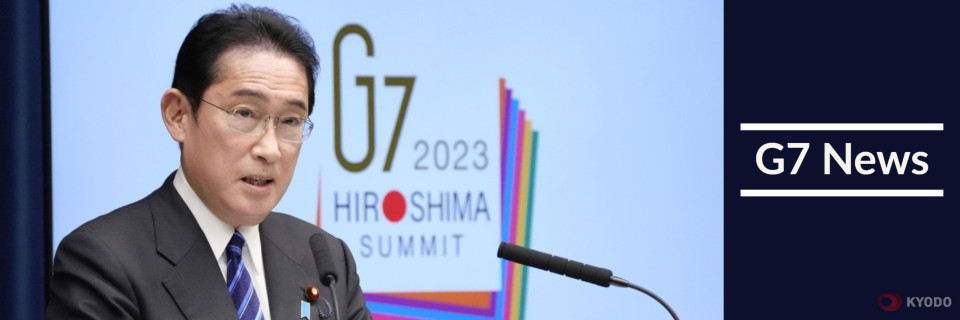Finance chiefs from the Group of Seven nations on Thursday began a three-day meeting in central Japan, as bank and debt woes add another layer of uncertainty over the global economy, already hit by Russia's war on Ukraine.
The G-7 is expected to confirm its unwavering support for Ukraine while keeping up the pressure on Russia to end its unprovoked war on its neighbor. Japanese Finance Minister Shunichi Suzuki said $1 billion will be mobilized to assist Ukraine-related efforts via the government-backed Japan Bank for International Cooperation.
The aid will go toward helping Ukraine's neighbors such as Poland and Romania, which have been taking in evacuees.
Japan, which holds the rotating G-7 presidency this year, is hoping that the group displays a united front in the face of challenges posed by Russia and China. A joint statement is expected at the end of the gathering, arranged to prepare for their leaders' summit next week in Hiroshima, western Japan.

The G-7 finance ministers and central bank governors will also seek to build more robust and diverse supply chains in collaboration with low- and middle-income nations in a move intended to enhance economic security.
The meeting in Niigata Prefecture comes as financial markets remain jittery over the strength of the banking sector following the collapse of several U.S. regional banks.
As political deadlock in the United States over its debt ceiling looms over the talks, U.S. Treasury Secretary Janet Yellen warned that a default would spark a "global downturn," saying there is no good reason to generate "a crisis of our own making."
Suzuki said the financial sector is facing a "drastically changing" environment, which poses a challenge for the G-7 group and beyond.
"We will seek to strengthen the financial sector through the G-7 dialogue," Suzuki told reporters before the meeting.
The widespread use of online banking, as well as the rise of social messaging platforms that have enabled information to spread instantly, are prompting a rethink by financial regulators.
The COVID-19 pandemic and Russia's unprovoked invasion of Ukraine have strengthened G-7 unity in recent years.
As the G-7, Britain, Canada, Germany, France, Italy, Japan and the United States plus the European Union are expected to underscore the need to continue depleting Moscow's war chest through sanctions, including a price cap on Russian oil, officials said.
High on the G-7 agenda is how to address attempts by Russia to evade the sanctions. Suzuki said "necessary action" will be taken to undermine Russia's capability to continue fighting the war, a stance likely to be shared by the group in their meeting with the virtual attendance of Sergii Marchenko, Ukraine's finance minister.
Another key G-7 topic is to make supply chains more resilient to future risks, amid building momentum toward decarbonization to tackle climate change with green technology, following disruptions to global supply chains of critical components like semiconductors,
In a rare move, non-members Brazil, India, Indonesia, South Korea, Singapore and Comoros, the chair of the African Union, have been invited to join part of the G-7 meeting to discuss global challenges, including debt issues affecting low- and middle-income nations
Bank of Japan Governor Kazuo Ueda, who assumed the post in April, said that financial markets appear to be stabilizing after a recent rout, but that he is keeping close tabs on developments.
"If (a default) happens, it will cause big (market) moves and create a big problem," Ueda told reporters.
The G-7 has taken the view that global growth remains resilient, despite increased inflation, while the financial system is resilient.
Among the G-7 nations' central banks, the BOJ is a dovish outlier, with no immediate tightening of monetary policy in sight under the new governor.
The U.S. Federal Reserve and the European Central Bank, among others, have been aggressively raising interest rates to rein in soaring inflation.
Related coverage:
Biden hints at attending G-7 summit virtually if debt issue drags on
G-7 leaders to hold 3 expanded sessions at Hiroshima summit
Japan eyes Hiroshima peace museum visit by G-7 spouses during summit











